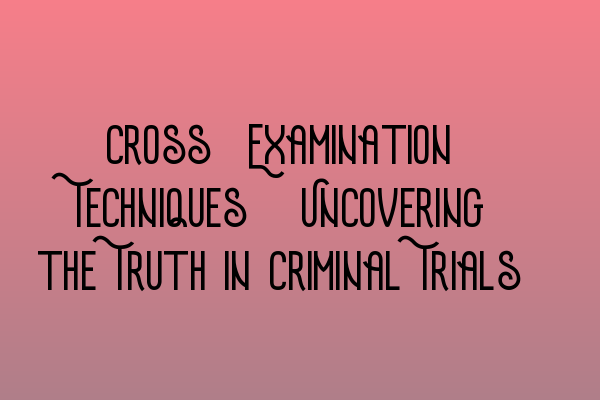Cross-Examination Techniques: Uncovering the Truth in Criminal Trials
Welcome to the SQE Criminal Law & Practice Law UK blog! In today’s post, we will explore the art of cross-examination and how it aids in uncovering the truth in criminal trials. Cross-examination is a crucial skill that every criminal lawyer must master, as it allows them to challenge the evidence presented by the prosecution and elicit favorable testimony from witnesses.
The Importance of Cross-Examination
Cross-examination serves as a powerful tool in the hands of a skilled criminal lawyer. It provides an opportunity to raise doubts about the credibility of witnesses, expose inconsistencies in their testimony, and challenge the prosecution’s version of events. By effectively cross-examining witnesses, lawyers can create reasonable doubt in the minds of the jury, ultimately leading to a favorable outcome for their clients.
Techniques for Effective Cross-Examination
1. Control the Witness: During cross-examination, it is essential to maintain control over the witness. This can be achieved by asking open-ended questions that encourage the witness to provide detailed answers. By controlling the flow of information, lawyers can steer the testimony in their favor.
2. Use Leading Questions: Leading questions are an effective way to guide the witness’s testimony and elicit specific responses. They often start with phrases like “Isn’t it true that…” or “Would you agree that…” By using leading questions, lawyers can shape the narrative in a way that supports their case.
3. Listen Carefully: Active listening plays a crucial role in effective cross-examination. Lawyers must pay close attention to the witness’s responses and be prepared to delve deeper into any inconsistencies or contradictions. By listening carefully, lawyers can identify weaknesses in the prosecution’s case and exploit them to their advantage.
4. Impeach the Witness: If a witness’s credibility is in doubt, lawyers can use impeachment techniques to challenge their testimony. This may involve highlighting prior inconsistent statements, exposing biases or prejudices, or questioning the witness’s motivation for testifying. Impeaching the witness can undermine the prosecution’s case and strengthen the defense’s position.
Preparing for Cross-Examination
Proper preparation is key to effective cross-examination. Lawyers must thoroughly review the case, analyze the evidence, and anticipate potential challenges. By understanding the strengths and weaknesses of both their own case and the prosecution’s case, lawyers can formulate intelligent and probing questions that lead to the truth.
If you need further assistance in preparing for your SQE exams, consider enrolling in our SQE 1 Practice Exam Questions or SQE 1 Practice Mocks FLK1 FLK2 to enhance your knowledge and test-taking skills. We also offer comprehensive SQE 2 Preparation Courses and SQE 1 Preparation Courses to ensure your success in the upcoming SRA SQE exams. Don’t miss out on our latest SRA SQE Exam Dates and start your preparation today!
Conclusion
Cross-examination is an indispensable skill in criminal trials. By employing effective techniques and thorough preparation, criminal lawyers can uncover the truth, challenge the prosecution’s case, and secure favorable outcomes for their clients. It is a nuanced art that requires both legal acumen and a deep understanding of human behavior. Perfecting the art of cross-examination is a journey that continues throughout a lawyer’s career, and its mastery can be the key to success in the courtroom.
